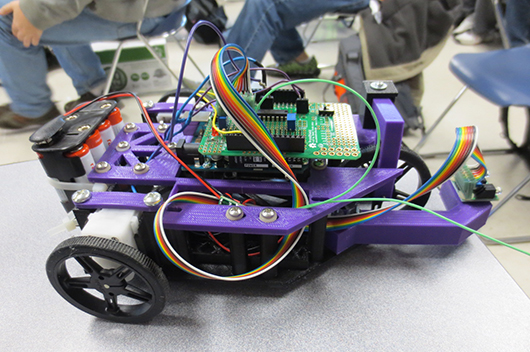 Engineering Technology
Engineering Technology
Bachelor of Science
The Engineering Technology (ET) degree program is geared toward application of ideas and theories and innovation. It is based on the foundation of science, technology, engineering, and mathematics (STEM). This degree program provides students with a broad range of exciting experiences in: computer graphics technology; computer and information technology; electrical engineering technology; industrial technology; mechanical engineering technology; and organizational leadership and supervision.
The United States Department of Education recognizes ET as a field that is primarily focused on engineering values and ideas, along with the technical skills necessary for typical engineering development projects. ET involves functions for research, production, operations, and programs that are designed for specific engineering fields.
Engineering technologists can use their education and application of STEM, for example, to help make and/or manage the production and related processes of roads/bridges, buildings, power distribution systems, racing teams, computers, software, electronic instruments, environment, and transportation systems that are used daily.
The ET graduate is prepared to immediately begin technical assignments, since many technology programs stress current industrial practices and design procedures. The ET graduate can apply established procedures which utilize current state-of-the-industry practice. The ET graduate is most likely to get hands-on jobs in technical sales, as a team leader, working in a laboratory, or field position.
Graduates work for companies across the technological, construction, distribution, health care, and engineering spectrum. They are best suited in entry-level positions that deal with application, production, implementation, engineering operation, sales and distribution such as product design, testing, development, systems engineering, field engineering or production, technical operations, and quality control.
Program Requirements
- All courses are 3 credit hours, unless otherwise designated
- All courses are offered by Purdue unless noted
First Year (31 cr.)
First Semester
- ENGT 18000 Engineering Technology Foundations
- ENGT 18100 Engineering Technology Foundations Lab (1 cr.)
- ENGL 10600 First Year Composition; OR
ENG-W 131 Reading, Writing, and Inquiry I (IU South Bend) - MA 15800 Precalculus – Functions and Trig
- TECH 12000 Design Thinking in Technology
- TLI 11100 Introduction to Manufacturing and Supply Chain Systems
Second Semester
- TLI 11200 Foundations of Technology Leadership
- MET 11100 Statics
- COM 11400 Fundamental of Speech Communication; OR
SPCH-S 121 Public Speaking (IU South Bend) - MA 16010 Applied Calculus I
- MET 14300 Materials and Processes I; OR
MET 14400 Materials and Processes II
Second Year (31 cr.)
Third Semester
- Humanities Foundation Selective
- ECET Selective
- Physics 21800 General Physics I; OR
PHYS-P 221 Physics 1 (IU South Bend) (4–5 cr.) - CGT 11000 Technical Graphic Communication
- Technical Selective
Fourth Semester
- Programming Selective
- ECET Selective
- Computer-Aided Design Selective
- Technical Selective
- ECON 21000 Principles of Economics; OR
ECON-E 103 Introduction to Microeconomics (IU South Bend); OR
ECON-E 104 Introduction to Macroeconomics (IU South Bend)
Third Year (31 cr.)
Fifth Semester
- Technical/Management Selective
- MET 24500 Manufacturing Systems
- Technical Selective
- TLI 31600 Statistical Quality Control
- ENGL 42100 Technical Report Writing
Sixth Semester
- Global/Professional Selective
- Lab Science Foundation
- Advanced Oral Communication Selective
- Technical Selective
- Technical Selective
Fourth Year (27 cr.)
Seventh Semester
- TECH 49600 Senior Design Project Proposal (1 cr.)
- TLI 33400 Production Cost Analysis
- Humanities/Liberal Arts Elective
- Technical Selective
- Technical Selective
Eighth Semester
- TECH 49700 Senior Design Project (2 cr.)
- Technical Selective
- Humanities/Liberal Arts Elective
- Free Elective
- Free Elective
- CAND 99100 (0 cr.)